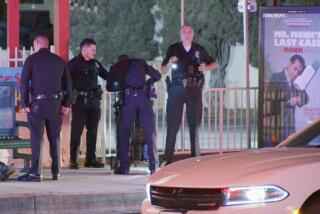Japan’s Train System Taking an Ominous Turn
- Share via
TOKYO — When 43-year-old Akira Maki, an employee of Chase Manhattan Bank, growled at a group of youths after one of them stepped on his foot during his train commute home, they growled back.
When Maki got off the train a few stops later, they followed him, beat him senseless on the platform and ran away, witnesses said. The banker never awakened from his coma, and the next week he was dead.
Commuter trains--once a symbol of Japan’s safety and efficiency--have come to represent something entirely different: danger.
“It’s scary just to get to work every day,” said Miwa Sakaguchi, a 25-year-old office worker. “And things aren’t getting any better.”
The yearly tally of violent crimes in Japan’s trains and stations nearly doubled from 1996 to 2000, increasing from 1,306 to 2,377, the National Police Agency says.
Adding to the unease are rises in pickpocket theft and groping of female riders.
Most of the violent incidents are seemingly senseless outbursts of drunken rage triggered by the most trivial of incidents--a dirty look, an angry word, an accidental push.
The assault on the banker Maki in Tokyo last April brought widespread attention to the problem. But police said they already had been monitoring the trend with concern for several months and had ordered stepped-up patrols at stations.
Experts say the root of the violence may lie in growing alienation among youths in Japan.
“Young people are feeling increasingly disenfranchised by society,” said Masachi Osawa, a professor of sociology at Kyoto University. “Any tiny thing, like being asked to give up a seat on a train, can light a fire under that anger.”
Japan’s rail system has enjoyed such a reputation for safety that it is still common to see businessmen snoozing, mouths hanging open, as they return home from a bottoms-up drinking session with colleagues.
Trains have long been the pride of Japan--the Japanese equivalent of the Swiss watch. If a timetable promises the inbound at 17 past the hour, you can pretty much bet it’ll appear with quartz-like precision.
But that image has been changing.
The recent rise in pickpocket thefts has become so worrisome that rail companies have resorted to announcements and posters warning passengers to beware of wallet-snatchers.
Gropers have become such a scourge that several Tokyo train lines have introduced “women only” cars for late-night services.
The pioneer of the system, Keio Electric Rail, which introduced the cars last March, said it was spurred to act by a sharp increase in women complaining they had been molested.
“We saw complaints rise steadily every year until they hit 351 in 2000,” said a company spokesman, Kenichi Nakahashi. “And that’s just the reported cases, the tip of the iceberg.”
The office worker Sakaguchi, who was waiting for a Keio train one recent afternoon, said she wasn’t impressed with the effort to curb gropers.
“What’s the point if they don’t have women-only cars at rush hour?” she said.
“I never use that line at those [late] hours anyway because I avoid Shinjuku late at night,” she added, referring to the Tokyo business and entertainment district that teems with bars and nightclubs.
But another company worker, 22-year-old Hiromi Hayashi, said the women-only cars, which operate from about 11 p.m. to 1 a.m., are better than nothing.
“The smell of makeup is a bit overwhelming, but I do feel safer,” she said.
Keio rail’s spokesman said the company just can’t afford to run single-sex cars at the hours when they would be most useful, the morning and evening rush hours. But Nakahashi calls the campaign a success.
“There’s been about a 30% decline in reported gropings,” he said.
More to Read
Sign up for Essential California
The most important California stories and recommendations in your inbox every morning.
You may occasionally receive promotional content from the Los Angeles Times.













